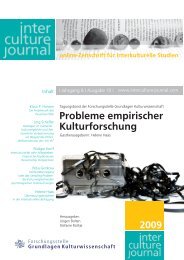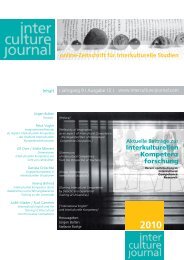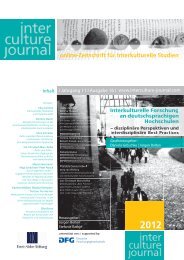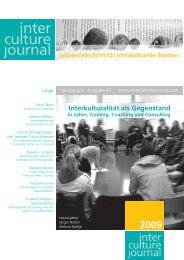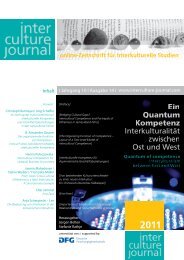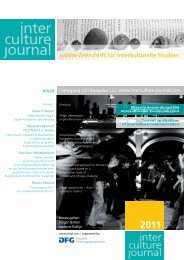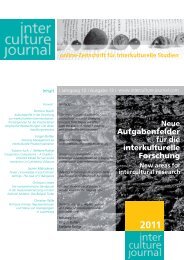Grundlagen Kulturwissenschaft - Interculture Journal
Grundlagen Kulturwissenschaft - Interculture Journal
Grundlagen Kulturwissenschaft - Interculture Journal
Erfolgreiche ePaper selbst erstellen
Machen Sie aus Ihren PDF Publikationen ein blätterbares Flipbook mit unserer einzigartigen Google optimierten e-Paper Software.
Rathje: The Definition of Culture: An application-oriented overhaul<br />
illustrate and describe the processual nature of culture, are<br />
actually tautological terms since cultural processes always occur<br />
"between" or "through" others. The effects of such interaction<br />
are amplified today in an environment rich with<br />
novel opportunities for collective membership and collective<br />
cross fertilization. While it may have been possible in the past<br />
to assume that a West German coal miner will vote for the<br />
social democratic labor party, increasing social variety, geographical<br />
mobility, and access to global communication networks<br />
cause the borders of collectives to shift and overlap:<br />
Not all Bavarian Catholics will vote for the Bavarian Christian<br />
conservative party. Brazilian teenagers go crazy for a German<br />
pop group whose style is rooted in a Japanese youth movement.<br />
A woman and an African American can become the<br />
German chancellor or the US president. The assumption of<br />
congruence between collective and culture has simply become<br />
untenable.<br />
Differentiation and multicollectivity must be accepted as<br />
characteristics of a viable concept of culture rather than internal<br />
coherence and primary collectivity.<br />
Further analysis of the traditional concept of culture within<br />
the four-field matrix will begin in the "cultural/plural" field<br />
which has typically been characterized by a coherence of collective<br />
customs. This assumption has already been dislodged<br />
by the existing critique of the coherence concept. Acknowledged<br />
approaches that describe the development and perpetuation<br />
of culture - the concept of "cultural memory"<br />
(Assmann 1992) for example - have demonstrated that members<br />
of a culture have access to a heterogeneous pool of cultural<br />
resources. Depending on current needs of their groups<br />
they recall pieces of the past respectively. The content of a<br />
culture at any given moment can therefore never be categorized<br />
as coherent.<br />
This principle can be illustrated with the variety of political<br />
orientations within a society. When, for example the various<br />
parties in Germany - including banned parties - recall elements<br />
of their common past, they reflect a wide spectrum of<br />
political orientations that influence German socio-political life.<br />
If, on the one hand, the German political landscape and the<br />
parties that inhabit it can be considered an integral component<br />
of German culture, it must also be accepted on the<br />
other hand that a fundamental feature of this culture is internal<br />
differentiation. This proof of heterogeneity, contradiction,<br />
and variety among the cultural customs also finds application<br />
in all other contexts of human interaction. Fundamental differentiation,<br />
therefore, must be recognized as a counterthesis<br />
to any postulation of internal coherence.<br />
47<br />
© <strong>Interculture</strong> <strong>Journal</strong> 2009 | 8



